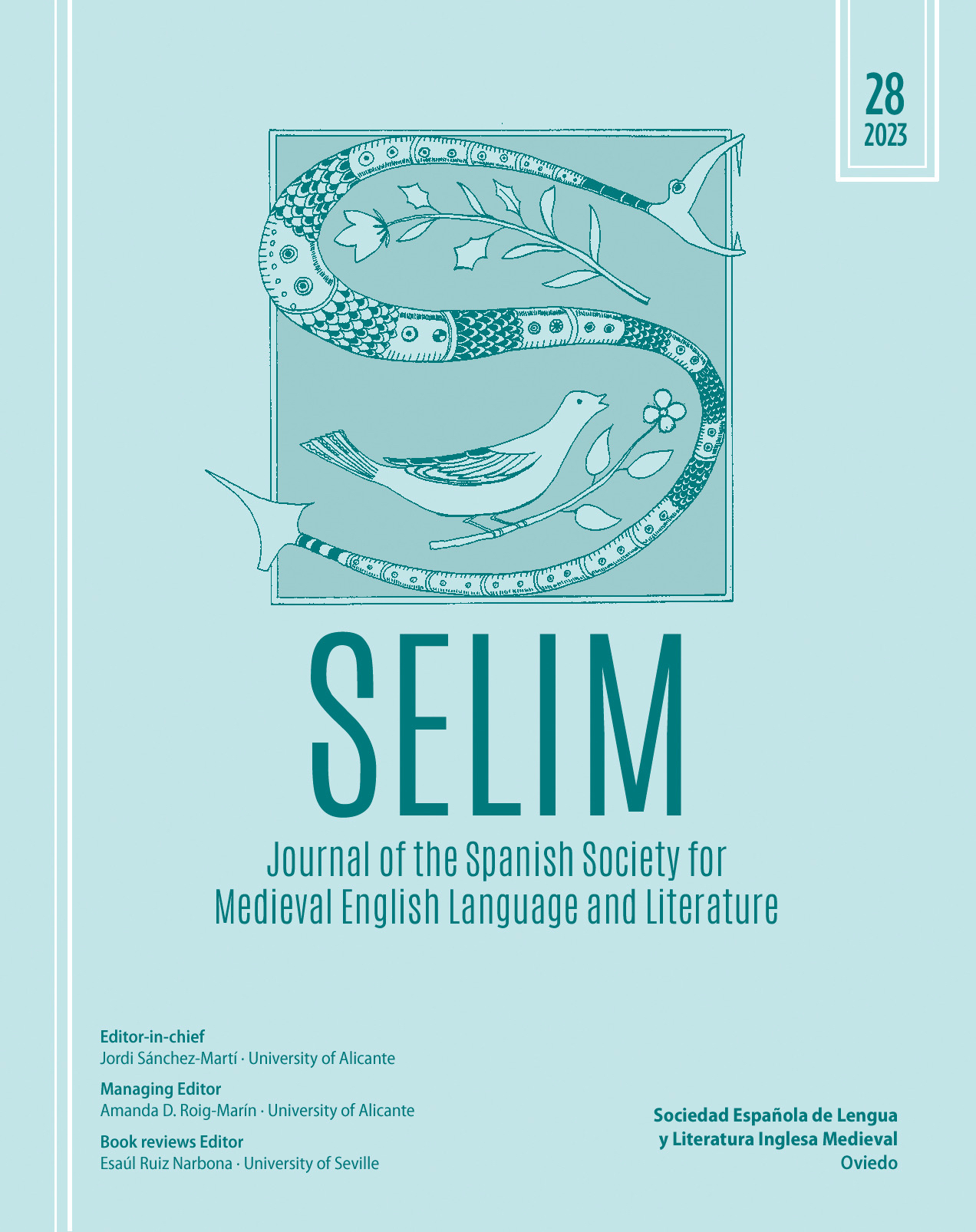Abstract
This work delves into the semantics of Old English lexical paradigms based on strong verbs. Its aim is to describe the patterns of semantic inheritance that hold in these paradigms, which present morphologically related words sharing the form and meaning of the base of derivation. The analysis carried out permits to circumscribe semantic derivation in these Old English lexical paradigms into the lexical entailment relations of troponymy, -troponymy, backward presupposition and cause, and the semantic relations of synonymy and opposition. The data of research has been retrieved from the lexical database Nerthus (Martín Arista et. al 2016). On the theoretical side, this examination follows the English lexical database WordNet (Princeton, 2010). This research unfolds a systematic methodology that is thoroughly described and illustrated by means of the paradigm (ge)berstan. It has not only been possible to circumscribe semantic derivation into the six semantic relations mentioned, but also to determine their frequency of occurrence in the paradigms under analysis, which indicates that synonymy and troponymy are the most recurrent semantic relations.
References
Cruse, David A. 1986. Lexical Semantics. Cambridge: Cambridge University Press.
Dowty, David. 1979. Word Meaning and Montague Grammar. Dordrecht: Reidel.
Fellbaum, Christiane. 1990. “English Verbs as a Semantic Net.” International Journal of Lexicography 3 (4): 278–301.
Fellbaum, Christiane, and George A. Miller. 1990. “Folk Psychology or Semantic Entailment?: A Reply to Rips and Conrad.” Psychological Review 97: 565–70.
Fellbaum, Christiane. 1998. “A Semantic Network of English Verbs.” In WordNet: An Electronic Lexical Database, edited by Christiane Fellbaum, 69–104. Cambridge: MIT Press.
García García, Luisa. 2019. “The Basic Valency Orientation of Old English and the Causative ja-Formation: A Synchronic and Diachronic Approach.” English Language and Linguistics 24 (1): 153–77.
Green, Rebecca, Carol. A. Bean, and Sung. H. Myaeng. 2002. The Semantics of Relationships. An Interdisciplinary Perspective. Vol. 3. Dordrecht: Kluwer Academic Publishers.
Jackendoff, Ray. S. 1983. Semantics and Cognition. Cambridge: MIT Press.
Lacalle Palacios, Miguel. 2021a. “Old English Verbs of Depriving: The Semantics and Syntax of Possession Transfer.” Studia Neophilologica 94 (1): 1–27.
Lacalle Palacios, Miguel. 2021b. “Old English Verbs of Learning: Information and Knowledge Acquisition.” SELIM. Journal of the Spanish Society for Medieval English Language and Literature 26 (1): 25–56.
Martín Arista, Javier. 2012. “Lexical Database, Derivational Map and 3D Representation.” RESLA-Revista Española de Lingüística Aplicada 1: 119–44.
Martín Arista, Javier. 2013. “Recursivity, Derivational Depth and the Search for Old English Lexical Primes.” Studia Neophilologica 85 (1): 1–21.
Martín Arista, Javier. 2019. “Another Look at Old English Zero Derivation and Alternations.” Atlantis 41 (1): 163–82.
Martín Arista, Javier. 2020. “Old English Rejoice Verbs. Derivation, Grammatical Behaviour and Class Membership.” POETICA 93: 133–53.
Martín Arista, Javier. 2022. “The Syntax and Semantics of the Old English Predicative Construction.” In Language Change and Linguistic Theory in the 21st Century, edited by Nikolaos Lavidas, and Kiki Nikiforidou, 102–132. Amsterdam: Brill.
Martín Arista, Javier, and Raquel Mateo Mendaza. 2013. “Outline of a Lexicon of Old English.” Working Papers in Early English Lexicology and Lexicography 3: 1–1996.
Martín Arista, Javier. ed., Laura García Fernández, Miguel Lacalle Palacios, Ana E. Ojanguren López, and Esaúl Ruiz Narbona. 2016. “NerthusV3. Online Lexical Database of Old English. Nerthus Project. Universidad de La Rioja.” Accessed January 1, 2021. https://nerthusproject.com.
Merriam Webster. 2022. “An Encyclopaedia Britannica Company.” Accessed January 1, 2021. https://www.merriam-webster.com/.
Miller, George A., Richard Beckwith, Christiane Fellbaum, Derek Gross, and Katherine Miller. 1993. “Introduction to WordNet: An On-line Lexical Database.” Accessed July 1, 2015. https://wordnetcode.princeton.edu/5papers.pdf.
Ojanguren López, Ana E. 2020. “The Semantics and Syntax of Old English End Verbs.” Atlantis 42 (1): 163–88.
Ojanguren López, Ana E. 2021. “Interclausal Relations with Old English Verbs of Inaction. Synchronic Variation and Diachronic Change.” RESLA-Revista Española de Lingüística Aplicada 34 (2): 555–84.
Princeton University. 2010. “About WordNet.” Accessed January 1, 2021. http://wordnet.princeton.edu.
Tío Sáenz, Marta, and Raquel Vea Escarza. 2015. “Intercategorial Homonymy in Old English.” Working Papers in Early English Lexicology and Lexicography 5: 1–61.
Vea Escarza, Raquel, and Marta Tío Sáenz. 2014. “Intracategorial Homonymy in Old English.” Working Papers in Early English Lexicology and Lexicography 4: 1–46.
Visser, Fredericus T. 1963–1973. An Historical Syntax of the English Language. Vol. I: Syntactical Units with One Verb. Leiden: E. J. Brill.

This work is licensed under a Creative Commons Attribution-NonCommercial-NoDerivatives 4.0 International License.
Copyright (c) 2023 SELIM. Journal of the Spanish Society for Medieval English Language and Literature.




